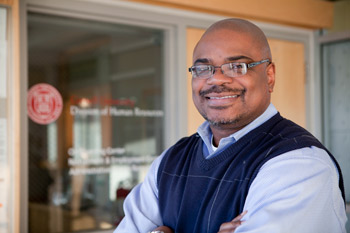Cornell encourages veterans to join its workforce
By Nancy Doolittle

The end of the Iraq war gives higher education institutions an opportunity to attract "the best and the brightest" to their workforces, says Captain Daniel Weed, professor of naval science and commanding officer of the Naval Reserve Officers Training Corps (ROTC) at Cornell.
But most hiring managers are unaware of the leadership capabilities, strong work ethic and finely honed skills that veterans can bring to civilian positions, he says.
Along with Diversity Recruitment Consultant Davine Bey and other staff members in Cornell's Recruitment and Employment Center (REC), Weed is working to bridge that awareness gap.
While those retiring from the military have leadership skills that make them excellent candidates for executive positions, Weed says, those separating from the military are often much younger and highly trained in such areas as operations, logistics, business, supply chain infrastructure, food service, medical services and hospitality -- all areas relevant to the needs of a large organization such as Cornell.
Weed estimates that 30-40 percent of veterans also hold advanced degrees, making them a largely untapped pool of exceptional talent.
Weed, himself, is a prime example of that talent. With 30 years of military service, he was U.S. Navy commander of fleet activities in Yokosuka, Japan, in charge of the largest U.S. naval base outside of the United States. He joined Cornell's Department of Naval Sciences a year and a half ago to teach and provide ROTC leadership.
Weed also helps vets connect with each other and identify their transferable skills to further their Cornell careers via Cornell's Veterans Colleague Networking Group, a group of self-identified vets from the Army, Navy, Air Force, Marine Corps and Coast Guard. "Our returning vets offer skills in project management, leadership, technical areas, information technologies, engineering, administration, facilities and law enforcement," says Bey, who works with human resource professionals across campus to attract the best candidates from the highly skilled pool of veteran applicants. "You can't teach the leadership they bring."
Cornell also offers veterans the opportunities and benefits they seek, Bey says. From a "Hire a Hero" career fair he attended last November at the USS Intrepid Sea, Air and Space Museum in New York City, Bey says that many vets know that Cornell is an excellent academic institution with a long history of association with the armed services; Cornell kept its ROTC program even during the decades when many other universities had eliminated theirs.
Unfortunately, he says, many vets are unaware that Cornell is a great place to work, noting that "they were pleased to see that we have veterans throughout the university in a multitude of roles." Vets are interested in such educational programs as Cornell's Employee Degree Program and in Cornell's support of work and family, Bey adds.
Weed added that making the transition from the military to Cornell was smooth for him, as he expects it would be for others.
"Cornell is similar to the military in its core values: strength of character, integrity, teamwork, citizenry, sense of community and volunteerism," says Weed, noting that, in addition, the Cornell community "welcomed me with open arms."
Media Contact
Get Cornell news delivered right to your inbox.
Subscribe